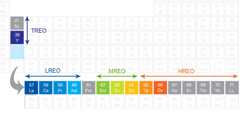Strategic Metals
Many investors are looking at opportunities to invest in strategic metals in order to bulk up a portfolio or otherwise contribute to solid gains over time. A strategic metal is basically a metal or mineral element that is important for some kind of industrial process or other use. Some experts tend to define strategic metals as metals that are in short supply in a particular country or region, or which are needed to manufacture products or in other major process that contribute to the nation’s gross domestic product or GDP.
Examples of Strategic Metals
Some types of strategic metals are critical to national defense, energy or aerospace industries. Some common examples are zinc, copper, silver and lead along with other elements like titanium and chromium.
In addition, many other strategic metals are related to the telecommunications and technology industries. Certain elements called ‘rare earth metals’ are commonly used to manufacture computers and mobile devices. These are some other strategic metals that can become extremely valuable due to a shortfall of supply over demand.
How Strategic Metals Contribute to a Portfolio
Investors use strategic means to make strategic metals a more valuable part of their holdings. Investors will seek to buy strategic metals before a shortfall exists, or before a market has recognized the full utility of these metals. Alternately, investors buy when there is still a reasonable supply of the metal, before industries to start to advertise that a scarcity may contribute to higher values in the future. Investors will look at international law and trade issues in order to try to anticipate the future values of strategic metals.
Buying Strategic Metals
Many strategic metals can be bought in physical form. However, this is not the only way that investors can profit from an investment in these elements. Today, many non-physical forms of investment exist for these metals, in the form of stock equities and more complex financial products.
In addition to stocks in mining companies or other companies participating in a supply chain process for strategic metals, investors can choose to utilize exchange traded funds or ETFs, indexes, or other kinds of funds that capitalize on changes of value for strategic metals. Many of these funds will be pegged to the value of a metal or group of metals, so that a change in value results in a corresponding change in valuation for the find. Here, investors have to look at any management fees or other costs that can skew a yield for a particular fund, and exactly how the fund’s value is based on the performance of strategic metals.
Tracking Strategic Metals in Commodities Markets
Another way that investors can look at strategic metals and related items is through a commodities market. Commodities markets and futures markets represent a system of continual evaluation for physical commodities, from essentials like food and oil to the kinds of metals that are useful in different industries. Investors can look at how certain elements are doing in a commodities market, as well as how derivative funds and company stock equities are changing. In many cases, the evaluation of strategic metals also corresponds with monitoring emerging economies, such as those of Brazil, Russia, India and China, along with periodic evaluation of other national economies, which can help investors understand the geopolitical issues around a certain type of strategic metal.
In short, strategic metals are those that are essential for tomorrow’s marketplace. Some of them are needed for new green technologies; while others are very much in use in conventional industries for building, medical uses, defense project, and much more. It often pays investors to look at which metals will be significantly more valuable as global supply and demand continues to change. Anticipating these changes can be a smart way to make a portfolio perform well, and many financial analysts continue to look at the many different kinds of strategic metals plays that can be part of an advanced broker or investor playbook. Focusing on these specific strategic metals is an alternative to staying broadly focused on national exchange indexes, and with proper diversification, these metals can be an essential part of any future capital allocation plan.

